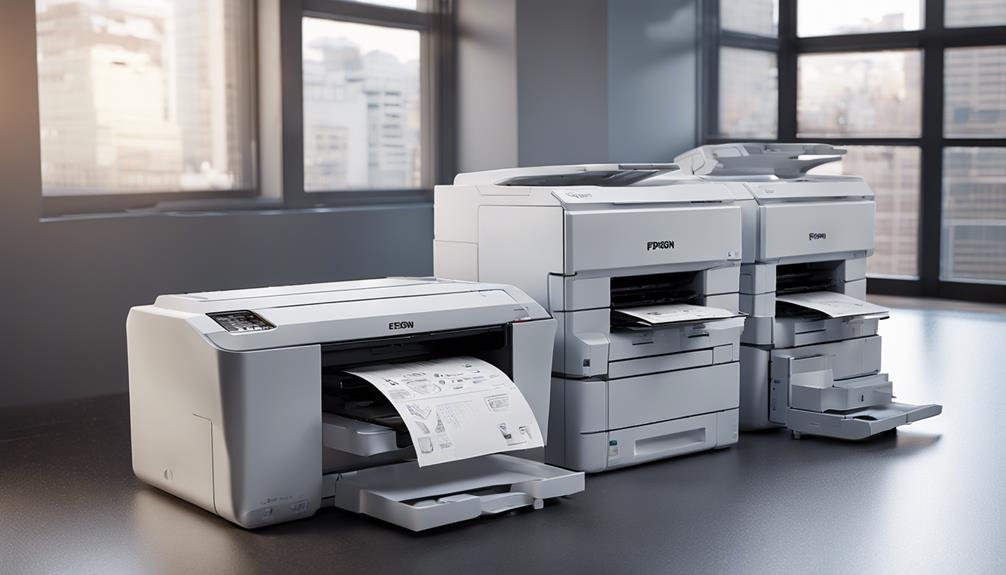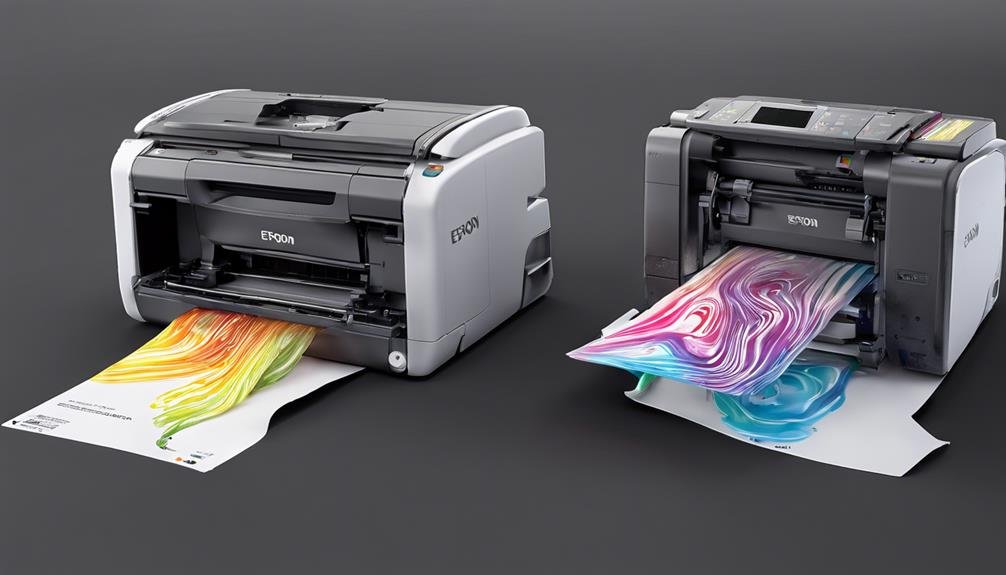When deciding between Epson and Canon printers, consider your printing needs. Epson printers offer warm, color-saturated prints, while Canon printers deliver natural-looking colors with excellent detail. Epson models generally have lower ink costs per page, but waste more ink during cartridge changes. Canon printers excel in efficient ink usage and minimizing waste. Both brands offer efficient paper handling capabilities, with Canon printers having large-capacity paper trays. Ultimately, consider your priorities in print quality, ink efficiency, and paper handling to choose the best fit for you – and explore more about each brand's unique features and advantages.
Print Quality Comparison
When it comes to print quality, you'll notice that Epson and Canon printers have distinct strengths, with Epson producing warmer prints with good color saturation, while Canon printers deliver natural-looking colors with excellent detail.
Concerning photo printing, Canon printers, such as the TS6020, are praised for vibrant and natural glossy prints, whereas Epson models offer warmer tones. However, Epson and HP models excel in color reproduction on plain paper, making them ideal for text prints. Canon printers, on the other hand, offer sharp text prints and good color reproduction.
Significantly, Canon printers have a reputation for delivering cleaner yellows and magentas compared to Epson, contributing to better color results in prints. Additionally, Epson's EcoTank system, which uses refillable ink cartridges, guarantees consistent print quality and minimizes waste.
When using specialty paper types, you'll find that both brands offer good color accuracy, but Canon's natural-looking colors might give it an edge. Ultimately, your choice between Epson and Canon will depend on your specific printing needs and preferences.
Ink Cost and Efficiency
You'll likely be pleased to find that Epson printers generally offer lower ink costs per page compared to Canon models, making them a more cost-efficient choice for high-volume printing. However, it's important to take into account the bigger picture when evaluating the ink cost and efficiency of these printers.
| Printer Brand | Ink Cost per Page | Ink Waste |
|---|---|---|
| Epson | Lower | Higher |
| Canon | Higher | Lower |
While Epson printers may have lower ink costs per page, they often waste more ink during cartridge changes, leading to higher overall ink usage. On the other hand, Canon printers are known for their efficient ink usage, minimizing waste and reducing the need for frequent cartridge replacements. Moreover, Canon's EcoTank system offers significant ink savings for long-term use. Ultimately, when choosing between Epson and Canon printers, it's important to take into account your specific printing needs and weigh the pros and cons of each brand's ink cost and efficiency.
Paper Handling Capabilities

When it comes to paper handling capabilities, Canon printers take the lead with their large-capacity paper trays, ensuring efficient paper handling for high-volume printing. This feature allows you to print large batches without constantly refilling the paper tray, making it ideal for high-volume printing needs.
Regarding paper handling, both Canon and Epson printers offer a wide variety of paper types to cater to diverse printing needs.
Here are some key features:
- Epson printers excel at handling specialty paper types, enhancing their versatility in printing tasks.
- Canon printers have special trays for CDs and DVDs, showcasing their advanced paper handling capabilities.
- Both printers support batch printing, allowing you to print large quantities efficiently, making them suitable for business-oriented printing tasks.
When it comes to paper handling, both Epson and Canon printers offer efficient paper handling capabilities, making them suitable for high-volume printing tasks. However, Canon printers take the lead with their large-capacity paper trays, making them ideal for high-volume printing needs.
Scanning and Copying Performance
Scanning and copying performance is a critical aspect of a printer's functionality, and Canon and Epson printers deliver differing levels of quality in this aspect. Regarding scanning, Canon printers offer good color reproduction and scan quality, making them suitable for different scanning and copying tasks.
Conversely, Epson printers excel in smooth changes in color graphics, enhancing the quality of scanned and copied documents. Concerning copy speeds and scan speeds, different brands and models have varying performance, allowing you to choose based on your specific requirements.
If you're looking for vibrant outputs, Epson printers are a great option. However, if you prioritize accurate color reproduction, Canon printers might be the better choice. When assessing the scanning and copying performance of Canon and Epson printers, consider the type of documents you'll be scanning and copying most frequently.
Will you be working with color graphics, or primarily scanning and copying text documents? By considering your specific needs, you can make an informed decision about which printer is best for you.
Ink Compatibility and Types

When it comes to printing costs, one key factor to take into account is the type and compatibility of ink cartridges, as both Canon and Epson printers offer flexibility in this area. When selecting a printer, you'll want to examine the types of ink cartridges available and their compatibility with your device.
Here are some key points to keep in mind:
- Both Canon and Epson printers support the use of OEM and third-party ink cartridges, providing you with flexibility in your ink choices.
- Epson's EcoTank models use refillable ink tanks, offering a cost-efficient printing solution.
- Some Canon printer models allow the use of refillable cartridges or offer refill kits, presenting another option for cost savings.
Both brands feature chip recognition, ensuring that the cartridges you use are compatible and function properly. This attention to ink compatibility contributes to long-term cost savings for users.
Printer Speed and Productivity
As you weigh your printing needs, you'll find that both Epson and Canon printers boast impressive speeds, allowing you to tackle high-volume tasks with confidence.
Epson printers, such as the WorkForce Pro WF-4830, offer high speeds for both document and photo printing, making them ideal for rapid printing needs.
Meanwhile, Canon printers, like the PIXMA TS6320, excel in fast document printing, enhancing productivity.
With commendable printing speeds, Epson printers are well-suited for high-volume printing tasks, ensuring efficient print speeds.
Canon printers prioritize speed and efficiency, making them suitable for rapid printing needs.
Both brands cater to productivity with their efficient print speeds for a variety of printing tasks.
Whether you need to print documents quickly or produce high-quality photos at a rapid pace, both Epson and Canon printers deliver.
With their impressive printer speed, you can tackle high-volume tasks with ease, ensuring your productivity remains high.
User Experience and Features

With your printing needs in mind, you'll find that the user experience and features of Epson and Canon printers reveal significant differences that can make or break your general satisfaction.
Regarding photo quality, Canon printers, such as the Pixma TS, are known for their exceptional color accuracy, making them a great choice for photographers and graphic designers. On the other hand, Epson's EcoTank models offer advanced scanning features and support for specialty media, making them ideal for artists and crafters.
Here are some key distinctions to keep in mind:
- Epson printers are recognized for their fast print speeds, but often compromise on photo quality, while Canon printers prioritize exceptional color accuracy, but may have slower print speeds.
- Canon printers offer automatic duplex printing, making them a great choice for busy offices, while Epson printers require more manual intervention.
- Canon ink is generally more affordable and efficient than Epson's OEM cartridges, which can be costly and wasteful.
Ultimately, the user experience and features of Epson and Canon printers cater to different needs and preferences. By understanding these variances, you can make an informed decision that meets your specific printing requirements.
Budget and Value for Money
When evaluating the total cost of ownership, you'll find that Epson printers generally offer better value for money, thanks to their lower ink costs and higher page yields compared to Canon. This is especially true for high-volume printing, where Epson's EcoTank system can provide significant ink savings.
However, Canon printers may have higher upfront costs, but they can provide cost savings in the long run with efficient ink usage. For instance, Canon's individual ink cartridges may be more expensive, but they can be more cost-effective for infrequent or black and white printing.
In terms of photo printing, both brands offer high-quality color prints, but Epson's refillable ink tanks can reduce the printing cost per print, making them a more budget-friendly option.
Ultimately, consider your printing frequency and volume to determine which brand offers better budget and value for your specific needs. By weighing the costs and benefits of each brand, you can make an informed decision that suits your printing requirements and budget.
Frequently Asked Questions
Which Is Better Epson or Canon Printers?
When choosing a printer, you consider factors like printer quality, ink efficiency, and paper handling. For you, it's about balancing color accuracy, print speed, and noise level with wireless connectivity and durability.
Which Printer Company Is Best for Home Use?
When choosing a printer for home use, you consider your family's needs, seeking a budget-friendly, space-saving option with a low noise level and excellent print quality, including color options, efficient paper handling, and ink efficiency to minimize maintenance costs.
Are Epson Printers Being Discontinued?
You're wondering if Epson printers are being discontinued? Rest assured, there's no truth to the rumors of Epson abandonment; their printer reliability and commitment to innovation mean no discontinuation or product sunset is in sight.
What Are the Downsides of Epson Ecotank?
You'll face downsides with Epson EcoTank printers, including messy ink refills that can lead to leaks, clogged nozzles, and slow printing, alongside paper jams, high maintenance, and noisy operation.
Conclusion
Based on your research, you've likely found that Epson and Canon printers have their strengths and weaknesses.
Epson excels in print quality, while Canon offers more affordable ink options.
Consider your specific needs: if you prioritize vibrant photos, Epson might be the better choice. However, if you're on a budget and need efficient ink usage, Canon could be the way to go.
Ultimately, weigh the factors that matter most to you and make an informed decision.